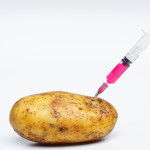By David Blyweiss, M.D., Advanced Natural Wellness
Maybe you’ve noticed when I talk about eating soy, I always tell you to choose organically grown soy. There’s a reason for that.
Most of the soy grown in the U.S. these days has been genetically modified—and it’s a big deal.
When a food has been genetically engineered, genes from bacteria, viruses, animals and other sources are inserted into plants to create a genetically modified organism (GMO). And these GMOs would never occur in nature.
Often called “Frankenfoods,” the FDA has decided to allow these genetically modified foods to be sold in every supermarket in America—without telling consumers.
But it’s not just soybeans. Corn, canola, sugar, rice, potatoes and tomatoes are also “tweaked” to make them resistant to bugs and/or disease. And since these foods aren’t labeled, it’s hard to tell if you’re buying food that was created in the lab or by nature.
You see, no one knows what the long term safety implications of eating these foods are.1Some preliminary animal studies have linked GMOs to infertility, immune system problems, accelerated aging, disruption of insulin and cholesterol regulation, gastrointestinal problems and organ damage.2
Until more is known about these safety concerns, I strongly advise avoiding genetically modified foods whenever possible. Here are three ways:
1. Buy organic. Certified organic foods cannot intentionally include any GMO ingredients. As often as possible, but products labeled “100% organic,” “organic” or “made with organic ingredients.”
Are You Suffering From...
- Love handles and a pot belly
- Romance that isn't what it used to
- Forgetfulness and inattention
- Low (or no) strength and endurance
- A sex drive that's shifted into neutral...or worse
If so...you may have Mature Male Burnout. Click here to discover more about this unique condition and what you can do about it.
2. Look for foods that carry the Non-GMO Project seal. These foods and their ingredients are independently verified to be GMO-free.
3. Avoid conventionally-grown foods or ingredients commonly modified. This includes:
- Corn, including cornmeal, cornstarch, corn oil, corn syrup (a.k.a. high fructose corn syrup) and other corn-based ingredients.
- Soy, including soy protein, soy milk, tofu, soy lecithin, soybean oil, and other soy-based ingredients that aren’t certified organic.
- Canola and cottonseed oil.
- Sugar beets. These are commonly listed on package ingredients simply as “sugar.”
- Dairy products from cows injected with GM bovine growth hormone. Look for dairy products labeled “No rBGH or rBST” or “artificial hormone-free.”3
The bottom line is no one has a clue about the long-term impact GMOs have on the human body. And that includes the folks who are producing these genetically modified food crops and dairy products. If we’re lucky, the impact will be minimal. But that may not be the case.
In any event, I certainly don’t want to be a guinea pig and I’ll bet you don’t either.
References:
- Domingo JL. Toxicity studies of genetically modified plants: a review of the published literature. Critical Reviews in Food Science and Nutrition. 2007;47:721-733.
- Pryme IF. In vivo studies on possible health consequences of genetically modified food and feed–with particular regard to ingredients consisting of genetically modified plant materials. Nutrition and Health. 2003;17:1-8.
- Danby FW. Comparing rbST-free, organic, and conventional milk. Journal of the American Dietetic Association. 2008;108:1991





